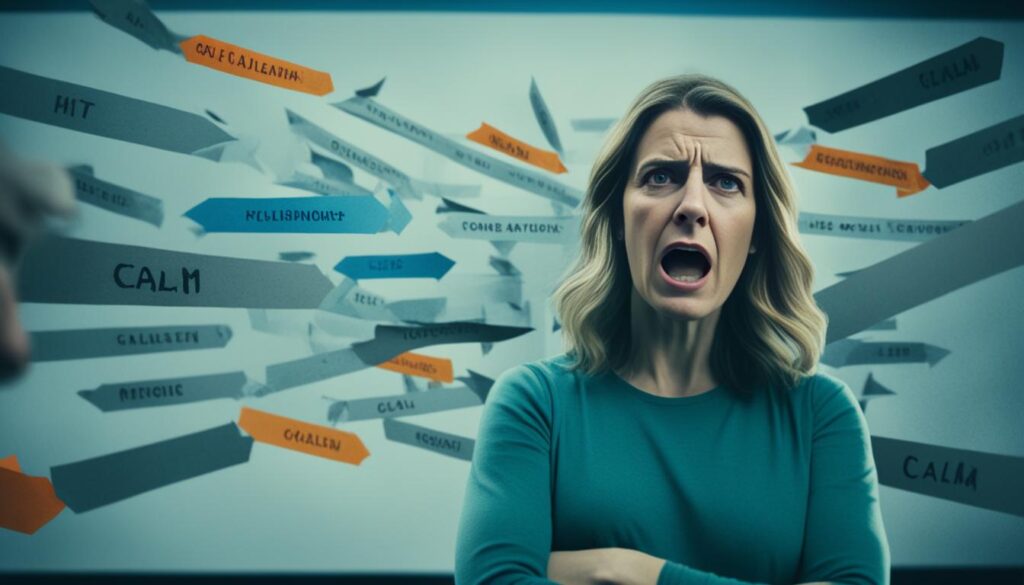Navigating Power Struggle Relationships Successfully

Did you know fights in relationships can sometimes ruin how well we talk and feel? These power struggles happen a lot. They really dig into our happiness, closeness, and how happy we are with our partner. But, there’s a way to fix things and get past these tough parts in a relationship.
This article dives into what makes power struggles in relationships tick. We’ll learn why they start and what they do. Plus, we’ll share some handy tips for keeping things smooth. If you’re butting heads over choices, money, who’s in charge, or who gets more love, this is for you. We’ll give you the know-how you need to tackle these tough spots together.
Understanding and dealing with these tussles can make your bond stronger. We’ll show you how!
Understanding Power Struggles in Relationships
Power struggles in relationships can be hard to handle. They often come from not dealing with issues, differences in how we see the world, and fears we have. These struggles can hurt the relationship in big ways.
The biggest problem is trust and talking breaking down. When one person holds more control, it’s tough to speak your mind. This leads to talking past each other and feeling far apart.
Fighting for power all the time can make you feel like you’re up against a wall. It leaves you tired, stressed, and not very happy. This constant struggle can lead to issues like anxiety and depression.
Intimacy takes a hit as love and closeness fade away. It’s hard to be both emotionally and physically close with so many issues. This can lead to a lot of bad feelings between partners.
“Power struggles in relationships are like a silent killer. They slowly erode the foundation of the relationship, leaving behind broken bonds and unmet needs.” – Dr. Jane Thompson
For better handling of power struggles, being open is key. Talk without blame to really understand each other. Also, knowing and respecting each other’s limits is vital.
Getting professional help can offer new ways to tackle these problems. Therapists can teach how to argue better and really listen. They help deal with the deeper fears causing these power fights.
Having the right balance between you and your partner is key. It’s important to keep your own interests alive while working on your relationship. This helps both of you grow together and avoid fights over power.
Knowing why power struggles happen and their effects is the first step. Working on these issues with good communication and clear boundaries can help. This way, you can build a strong and happy relationship.
Types of Power Struggles in Relationships
Power struggles in relationships vary a lot. They can focus on different parts of how the couple interacts. For example:
1. Power Struggles in Decision-Making
Some couples fight over making decisions. They may clash about big choices like where to live or career moves. These battles often come from a need for control or not seeing eye-to-eye on what’s best.
2. Power Struggles in Finances
Money can also spark power struggles. Talk of budgets, who’s in charge of spending, or saving can quickly turn into arguments. These fights can reveal deep insecurities or differences in values about money.
3. Power Struggles in Control
Control fights might be about who’s the boss or freedom. They reflect deeper issues of power and independence. Feeling the need to be in charge or to push back against control can lead to tension.
4. Power Struggles in Attention and Affection
Relationships also struggle with sharing attention and love. This could be seen in jealousy or the need for more emotional closeness. It often links back to past experiences or fears about not feeling loved enough.
It’s important to spot what kind of power struggle you’re facing. Understanding why they happen is key to making your relationship healthier. This insight helps couples find better ways to solve problems and work as a team.
Causes of Power Struggles in Relationships
Power struggles in relationships might come from different places. These include not seeing eye to eye on personality and values. Sometimes, past problems or worries about control also play a big role. These issues can make life hard for couples.
Differences in Personality and Values
One key reason for power struggles is when couples think very differently. This could be about what they believe, their opinions, or how they tackle problems. For instance, if one person loves their freedom but the other needs constant togetherness, decisions can lead to tension. This can make it hard to move the relationship forward.
Unresolved Past Issues
Stuff from the past can also mess things up. Things like old hurts, how we were raised, and big disappointments can hurt our present. If these things aren’t dealt with, one might try to control things out of fear. This control can really mess up a romantic relationship. But dealing with past problems can help stop this.
Insecurity and Fear of Loss of Control
Feeling unsure or scared about losing control can lead to battles in relationships. This might happen due to bad past relationships, not feeling good enough, or fearing being left alone. Overcoming these deep fears and working on trust can stop these power fights.
It’s important to understand what causes power struggles. This way, couples can begin to make things right. By looking at personality differences, past issues, and fear of losing control, relationships can become healthier and happier.
Effects of Power Struggles in Relationships
Power struggles in relationships can really hurt the partners. It can make things tough and put a strain on their bond.
“Power struggles often emerge as a result of conflicting desires, needs, or perspectives within a relationship, causing damage to trust and communication.”
Power struggles mess with trust and talking with each other. Partners find it hard to share openly. They focus more on controlling than on listening and understanding.
They can also mess up how you feel. All the arguing and stress can make you anxious and frustrated. This hurts not just your mood but also your mental health.
“Power struggles have the potential to decrease intimacy and affection between partners, leading to a sense of emotional distance and disconnection.”
Power battles can make couples less loving. They fight for control so much that they forget to show love. The closeness that keeps a relationship strong starts to fall apart.
These fights can also bring more arguments. Different opinions and the need to be in charge lead to bigger fights. This makes the relationship feel more tense and unfriendly.
“If left unaddressed, power struggles can create a cycle of damage to trust, communication breakdowns, diminished emotional well-being, decreased intimacy, and increased conflicts.”
It’s very important to see how bad power struggles are and do something about them. Addressing their negative effects is the first step to making things better. This includes trust, how you talk, how you feel, getting close again, and stopping the fighting.
Image:

Coping with Power Struggles in Relationships
To handle power struggles in relationships, you need good communication. Setting clear boundaries is also important. Seeking help from therapists or counselors can be key, along with balancing power and independence.
Communicating openly and honestly is vital. It involves sharing your thoughts and feelings without blaming or criticizing each other. This creates a space for partners to listen and understand what the other needs. It helps find compromises that work for both.
Setting boundaries and establishing mutual respect is another essential step. Boundaries show what behaviors are okay and not okay in a relationship. Partners must respect each other’s boundaries to feel safe and valued. This builds trust and reduces power struggles.
“Setting boundaries is not a betrayal of love, but rather an essential form of self-care.”
If you find power struggles hard to handle alone, turning to a therapist or counselor is wise. They offer guidance on better communication and ways to solve conflicts. They also dig into the root causes and offer strategies for managing power dynamics.
Striking a healthy balance of power and independence is crucial too. Each partner should keep their own interests alive while nurturing the relationship. This mix supports both personal growth and a strong, supportive partnership.
Using strategies like open and honest communication, setting respectful boundaries, seeking therapy or counseling, and maintaining a balance of power and independence can strengthen your relationship. It helps you both handle power issues and lays the groundwork for a happy, lasting bond.
Creating Mutual Understanding and Collaboration
To reduce power struggles in a relationship, it’s vital to foster mutual understanding and collaboration. Use strategies like active listening and assertive communication. These can improve communication and aid in solving conflicts. By truly listening to your partner and clearly sharing your thoughts, you lay a foundation of communication built on honesty and openness.
Empathy is crucial for mutual understanding. It lets you understand your partner’s feelings and viewpoints. By sharing their experiences, you validate their feelings. This creates a safe area for them to speak.
“Respecting differences in opinion is essential in any relationship. It opens the door to important talks and helps both see other viewpoints.” – John Jones, Relationship Expert
Validation is pivotal for working together. It doesn’t mean you have to agree. It’s about respecting their opinion. This prevents power struggles by encouraging mutual respect.
Fostering open, honest, and non-judgmental communication enhances collaboration. It creates a space where both of you can speak freely. By respecting each other’s boundaries, you encourage a healthier dynamic.
Enhancing Collaboration with Active Listening
Active listening is vital for better collaboration. It means focusing entirely on what your partner is saying. Avoid jumping ahead to your response. Listening closely shows you care and are engaged.
It’s key to acknowledge your partner’s feelings and thoughts. Try to avoid being defensive. Understanding their perspective, even if you don’t agree, is crucial. This validates their emotions and fosters a peaceful dynamic.
Building Empathy and Respecting Differences in Opinion
Empathy helps you understand each other’s feelings and experiences better. It means making an effort to stand in your partner’s shoes. This connection closes the gap between your differing viewpoints.
Respecting different opinions is vital in partnerships. It leads to important discussions. When opinions clash, look for common ground. This way, both of you feel understood and valued.
- Create a culture of open, honest, and non-judgmental communication.
- Practice active listening and acknowledge your partner’s feelings and thoughts.
- Build empathy by trying to understand and connect with your partner’s perspective.
- Respect differences in opinion and focus on finding common ground.
- Validate your partner’s point of view to promote mutual respect and understanding.
Following these steps, you can establish a culture of mutual understanding and collaboration. This can lessen power struggles and strengthen your relationship.
Seeking Professional Help
Dealing with tough power fights in your relationship can be hard. Seeking help from a mental health counselor or a relationship coach is smart. They create a safe place for you both to dig into what’s going on. They also guide you in talking better and solving problems.
Therapy lets you see your own patterns and behaviors. It’s a chance to change and grow. By working on the deep issues, you can make your relationship better.
“Seeking professional help allows couples to navigate through their power struggles in a supportive environment, enabling them to gain a deeper understanding of themselves and each other.”
In therapy, you and your partner can get better at talking. You can say what you need and hear each other out. This builds trust and respect, making your bond stronger.
Getting help also gives you tools to handle tough times. It’s key when the fights seem too big. You’ll learn ways to make peace and work better together.
Image: 
Why Seek Professional Help?
Professional help has many good sides for couples facing struggles:
- Objective Guidance: They offer a fresh look at your problems.
- Safe Space: Sessions are a place where you can talk freely without fear of judgment.
- Conflict Resolution Skills: You’ll learn better ways to handle disagreements.
- Healing Past Wounds: Old issues that fuel your fights can be addressed, helping you heal.
- Improved Communication: They help you talk and understand each other better.
Getting help doesn’t mean your relationship is weak. It shows you care. Working with a pro is a positive step. It makes your love stronger and healthier.
Taking Personal Responsibility
Taking personal responsibility is key to handling power struggles in relationships. It needs you to look within and spot what makes these fights happen. This includes looking at your own fears and past issues.
Working on yourself can help you overcome old hurts and learn new ways to handle tough times. It’s about seeing how your actions and feelings impact the relationship.
Looking at your behavior helps you see why you react the way you do. This introspection means questioning your own thoughts and how you act around your partner.
Knowing yourself means being alert to how you think and feel in your relationship. It helps you know if you’re trying to control things, or if you’re bringing up old pains without meaning to.
Taking responsibility can end the fight cycle, making your relationship better. It needs you to be brave and open about your weak spots, but it’s worth it for a happier, healthier bond.
Realizing you need to grow is a big part of this responsibility. You might seek help from professionals to learn how to manage these struggles better.
Working on yourself doesn’t stop—it’s something you commit to. This means getting better at understanding emotions and talking things out, setting clear limits, and showing care for both yourself and your partner.
Self-awareness:
- Examining one’s own beliefs and attitudes
- Recognizing patterns of behavior
- Mindfully responding instead of reacting
- Being open to feedback and self-reflection
Personal growth:
- Building emotional resilience
- Developing healthier coping mechanisms
- Healing past wounds and traumas
- Cultivating self-love and self-acceptance
Taking responsibility and working on yourself can really change your relationship for the better. It lets you step out of harmful arguments and build a stronger, happier bond with your partner.
Committing to Growth and Transformation
To overcome power struggles in relationships, partners need to commit to growth. This includes working on personal development and improving how they interact. This shift in attitude and effort can make a big difference. Both should focus on bettering communication, understanding, and how they solve problems.
Growth is accepting that relationships change and need work. It’s about always being ready to learn and improve, both alone and together. By investing in becoming better people, they enrich their bond. This leads to a relationship that’s more satisfying and peaceful.
“Growth is painful. Change is painful. But nothing is as painful as staying stuck somewhere you don’t belong.” – Mandy Hale
Making a relationship better means challenging the old. It involves owning up to what you’ve done, and being ready to grow. Sometimes, you might need outside help like therapy. Professionals can offer advice and strategies to help you change for the better.
Getting to a place of transformation takes time, patience, and work. It’s about getting better at how you talk, understand each other, and deal with conflicts. By focusing on growth, your relationship can become a vehicle for personal change and bonding.
Conclusion
Power struggles are common in relationships, but they’re not impossible to overcome. By using good communication and trying to understand each other, couples can handle challenges. Seeking advice from professionals like mental health counselors can offer valuable help.
It’s also key to work on ourselves. Seeing how we affect situations and choosing to grow can change power struggles into chances to make our bonds stronger. This means looking within, being aware, and dealing with past issues to move forward in a healthy way.
Finding the right mix of power and space in a relationship is crucial for peace and happiness. It takes work, but with open talks, shared goals, and self-improvement, couples can beat power struggles. They can then create a solid base for a loving, lasting relationship.






